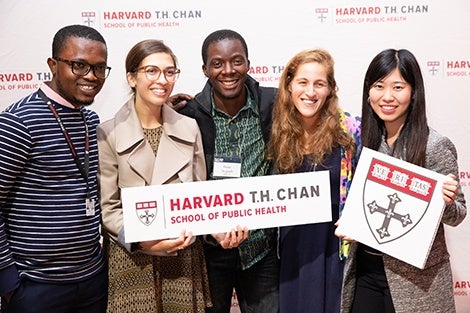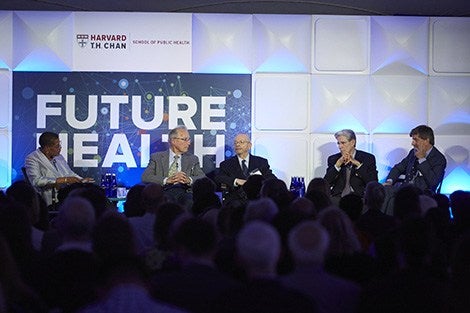Harvard Chan School marks the end of a successful capital campaign and envisions public health’s next 30-50 years
September 24, 2018 – Hundreds of Harvard T.H. Chan School of Public Health supporters, alumni, students, faculty, and staff gathered under a big tent on the Kresge Quad on September 21 to celebrate the generosity of contributors to the School’s successful capital campaign and to highlight the School’s research priorities for the future. Dean Michelle Williams, SM ’88, ScD ’91, emceed the festive event, which marked the end of a campaign that brought in nearly $933 million to advance the cause of public health—well beyond the $450 million goal announced five years ago. She expressed deep gratitude for the support and generosity of the many people and organizations who championed the campaign and the School’s mission.
The event, called “Future Health: The Promise and Possibilities of a New Era in Public Health,” featured a panel discussion with former Harvard Chan School deans; campaign reflections from Jonathan Lavine, MBA ’92, co-chair of the School’s capital campaign; remarks from Harvard University’s new president, Lawrence Bacow, JD ’76, MPP ’76, PhD ’78; presentations from researchers; and a number of videos created for the event. A community celebration featuring globally inspired food, drink, and music topped off the program.
Looking back, looking ahead
The former deans discussed topics ranging from technological advances in public health to leadership challenges they faced during their tenures. The panelists included Howard Hiatt, MD ’48 (1972–1984); Barry R. Bloom, PhD (1999–2009); Julio Frenk, MD, MPH, PhD (2009–2015); and David Hunter, MBBS, MPH ’85, ScD ’88 (acting dean, 2015–2016). Dean Williams moderated the discussion.
Hiatt, associate chief of the Division of Global Health Equity at Brigham and Women’s Hospital and professor of medicine in the Department of Global Health and Social Medicine at Harvard Medical School, spoke about creating programs at the School that brought the power of the quantitative analytical sciences of biostatistics and epidemiology to bear on helping evaluate and improve the quality of medical care.
Bloom, Joan L. and Julius H. Jacobson Research Professor of Public Health at Harvard Chan School, discussed how the School’s work around the world, particularly its efforts to help curtail AIDS in Africa, helped push Harvard University as a whole to become a more global institution.
Frenk, president of the University of Miami, said higher education is more important than ever. “Some fundamental values on which our work is based are under attack,” he said. “The capacity for civil and civic engagement. The ability to disagree respectfully, understanding another person’s perspective before dismissing it. The value of pursuit of truth—understanding how complex and contradictory it is, but nonetheless committing to that as our fundamental mission.” In an era in which expertise is being questioned and people talk about “alternative facts,” it’s crucial for universities to provide an example to society—“that the reliance on expertise, on respectful civil and civic engagement, is possible,” Frenk said.
Commenting on public health challenges for the next 50 years, Hunter, Richard Doll Professor of Epidemiology and Medicine at the University of Oxford and director of the Harvard-Oxford Program in Epidemiology, said that public health has a special responsibility to continue to address potential existential threats to humanity itself, including climate change, pandemics, and nuclear war.
Watch a video about the Harvard Chan Frontiers, the School’s next targets for humanity’s needed breakthroughs in public health.
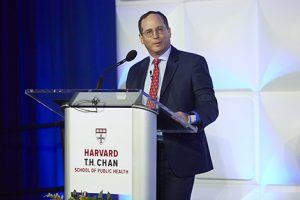
“Stubborn, unrelenting optimism”
Lavine, who co-chaired the capital campaign with his wife Jeannie, expressed gratitude for the outpouring of support from the entire Harvard Chan community. He highlighted the $350 million gift from the Morningside Foundation, headed by Gerald Chan, SM ’75, SD ’79, and his brother Ronnie, which resulted in the renaming of the School after their father. “This gift was an absolute game-changer for the School,” Lavine said. “It was a vote of confidence that will resonate for decades.”
He gave a breakdown of the types and amounts of gifts, but noted that the campaign was about more than just numbers. “This campaign was about looking beyond our walls, about tackling the big public health issues, whether here in Boston, or across the world in places like Botswana,” he said. The highly successful campaign, paired with the Harvard Chan community’s “stubborn, unrelenting optimism,” puts the School on firm footing for future accomplishments to improve the lives of people everywhere, he said.
Watch a thank-you message to our supporters.
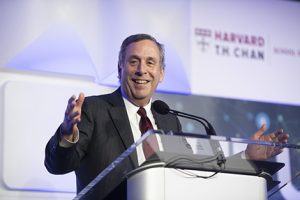
Public health, public service
Bacow emphasized the importance of communicating to a skeptical public that much of the work at both Harvard University and at Harvard Chan School is carried out for the benefit of the greater public. “Everybody benefits when we understand more about the air we breathe, the water we drink, and the food that we eat,” he said. “Everyone benefits when we keep drunk drivers off the road and we discourage people from consuming tobacco. Everyone benefits when we uncover the human cost of climate change and shed light on the realities of gun violence. What happens here is not just public health, it is public service.”
He added, “The Talmud teaches us that to save just one life is the equivalent of saving the entire universe. If you think of the work that is done here—this School saves lives a million at a time—we have saved and continue to save the universe, over and over and over again. I submit to you that there is no higher calling than the work that is done by this School, which transforms lives, transforms society, creates opportunity, and gives meaning to the lives that people live here and everywhere.”
Watch a message from Gerald Chan discussing his appreciation for his time at the School and his pleasure at being able to support the School with a naming gift.
The promise of a healthier future
In short presentations dubbed “lightning talks,” three professors talked about public health research that promises to transform the fight against obesity, dementia, and air pollution.
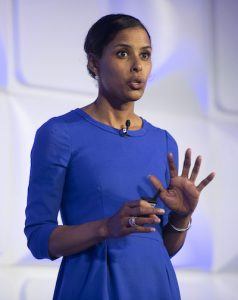
Sara Bleich, PhD ’07, professor of health policy at Harvard Chan School, discussed the impact of including calorie counts on restaurant menus and levying taxes on sugary beverages. Research has suggested that such changes can make a significant impact on reducing obesity. When it comes to what people consume, Bleich said, it’s important to focus not just on individual behavior change, but also on public policies that remove calories from people’s diets a little at a time.
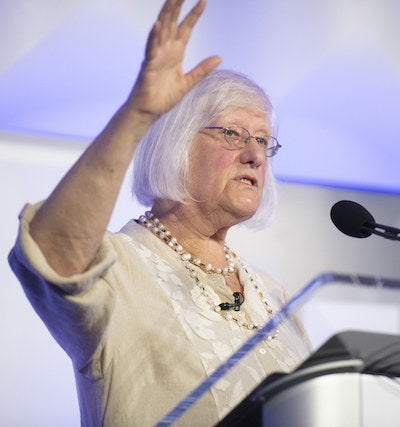
Valerie Beral, FRS, professor of epidemiology and co-director of the Cancer Epidemiology Unit in the Nuffield Department of Population Health at the University of Oxford, spoke about how vascular issues appear to be a significant driver of dementia.
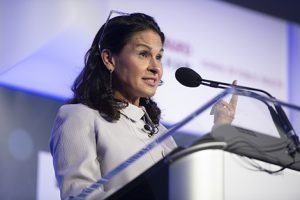
And Francesca Dominici, PhD, Clarence James Gamble Professor of Biostatistics, Population, and Data Science at Harvard Chan School and co-director of the Harvard Data Science Initiative, discussed her use of data science to help uncover the dangers of air pollution, even at a very local level. She said it’s not just important to use data science to analyze public health problems, but also to improve the methods employed in data science itself. “Public health and data science are at an incredible scientific moment,” she said.
Lifting lives on a world scale
Videos that punctuated the event featured messages from Massachusetts Gov. Charlie Baker and Harvey Fineberg, who served as dean of Harvard Chan School from 1984 to 1997 and is currently president of the Gordon and Betty Moore Foundation. Gerald Chan appeared in a video discussing his appreciation for his time at the School and his pleasure at being able to support the School with a naming gift.
In closing remarks, Williams outlined the Harvard Chan Frontiers—the School’s next targets for humanity’s needed breakthroughs. The Frontiers include:
- Reimagining aging – Uncovering how aging people and societies can be stronger than ever
- Overcoming violence – Dissecting the whys and hows behind violence to stop it before it starts, repair its damage, and build resilience
- Confronting climate change – Uncovering the human consequences of pollution policies, the nuances of the changing environment, and possible solutions
- Cultivating well-being and nutrition – Studying barriers to human thriving such as obesity, social isolation, and unhappiness in order to advance health and happiness for all
- Conquering epidemics – Fighting on many fronts to make sure that humanity is ready when the next big outbreak happens
“When you take the frontiers together, you see that we’ve described the extraordinary breadth and depth of the work we do here at Harvard Chan School,” said Williams. “And you can also see the scope of our ambition.”
Watch messages from Massachusetts Gov. Charlie Baker and Harvey Fineberg, who served as dean of Harvard Chan School from 1984 to 1997 and is currently president of the Gordon and Betty Moore Foundation.
Photos: Kent Dayton, Tony Rinaldo, Nilagia McCoy
